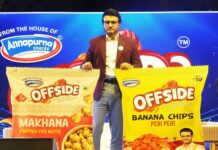Nestlé has created a unique chocolate made entirely from the cocoa fruit, using cocoa beans and pulp as the only ingredients and therefore not adding any refined sugar. The company plans to introduce the first product in Japan in the autumn of this year through its KitKat Chocolatory. Further products in other countries will follow next year, through some of Nestlé’s most popular confectionery brands.
According to Nestlé, it has developed a natural approach, which allows it to extract the pulp and use it in chocolate with no compromise on taste, texture and quality. Until now chocolate has been made with the addition of refined sugars. The company claims that this patented innovation delivers a great tasting chocolate using only one ingredient – the cocoa fruit.
Patrice Bula, head of Strategic Business Units, Marketing and Sales at Nestlé shared, “We are proud to bring chocolate lovers a new chocolate made entirely from the cocoa fruit without adding refined sugar. This is a real innovation which uses the natural sweetness of the cocoa pulp to provide a pure, novel chocolate experience.”
The cocoa fruit contains cocoa beans and cocoa pulp. The pulp surrounds the beans; it is soft, sweet and white in color. Some of the pulp is used in the fermentation of the cocoa beans after they are harvested, but a significant proportion is usually removed and the value is lost. Until now it has not been used as an ingredient to naturally sweeten chocolate.
With the recent announcement, Nestlé claims its leadership in the confectionery category by driving innovation and creating new, natural and exciting products. According to Nestlé, it was the first to bring Ruby chocolate to market in 2018 with KitKat, first in Japan and then across Europe.
IndiFoodBev — authentic, impactful and influential
An English-language food and beverage processing and packaging industry B2B platform in print and web, IndiFoodBev is in its third year of publication. It is said that the Indian food and beverage industries represent approximately US$ 900 billion in revenues which implies more than 20% of the country’s GDP. Eliminating the wastage on the farmside can help to deliver more protein to a higher number of the population apart from generating sizable exports. The savings in soil, seeds, water, fertilizer, energy and ultimately food and nutrition could be the most immense contribution that country is poised to make to the moderation of climate change.
To improve your marketing and grow sales to the food and beverage processing and packaging industry, talk to us. Our research and consulting company IppStar [www.ippstar.org] can assess your potential and addressable markets in light of the competition. We can discuss marketing, communication, and sales strategies for market entry and growth.
Suppliers and service providers with a strategy and budget for targeted marketing can discuss using our hybrid print, web, video, and social media channels to create brand recognition linked to market relevance. Our technical writers are ready to meet you and your customers for content.
The second largest producer of fruit and vegetables in the world is continuously expanding processing capacities and delivery systems with appropriate innovative technologies. We cover product and consumer trends, nutrition, processing, research, equipment and packaging from farm to thali. Get our 2025 media kit and recalibrate your role in this dynamic market. Enhance your visibility and relevance to existing markets and turn potential customers into conversations. Ask for a sample copy of our bi-monthly in print or our weekly IndiFoodBev eZine each Wednesday.
For editorial info@ippgroup.in — for advertisement ads1@ippgroup.in and for subscriptions subscription@ippgroup.in
Naresh Khanna – 10 February 2025
Subscribe Now











